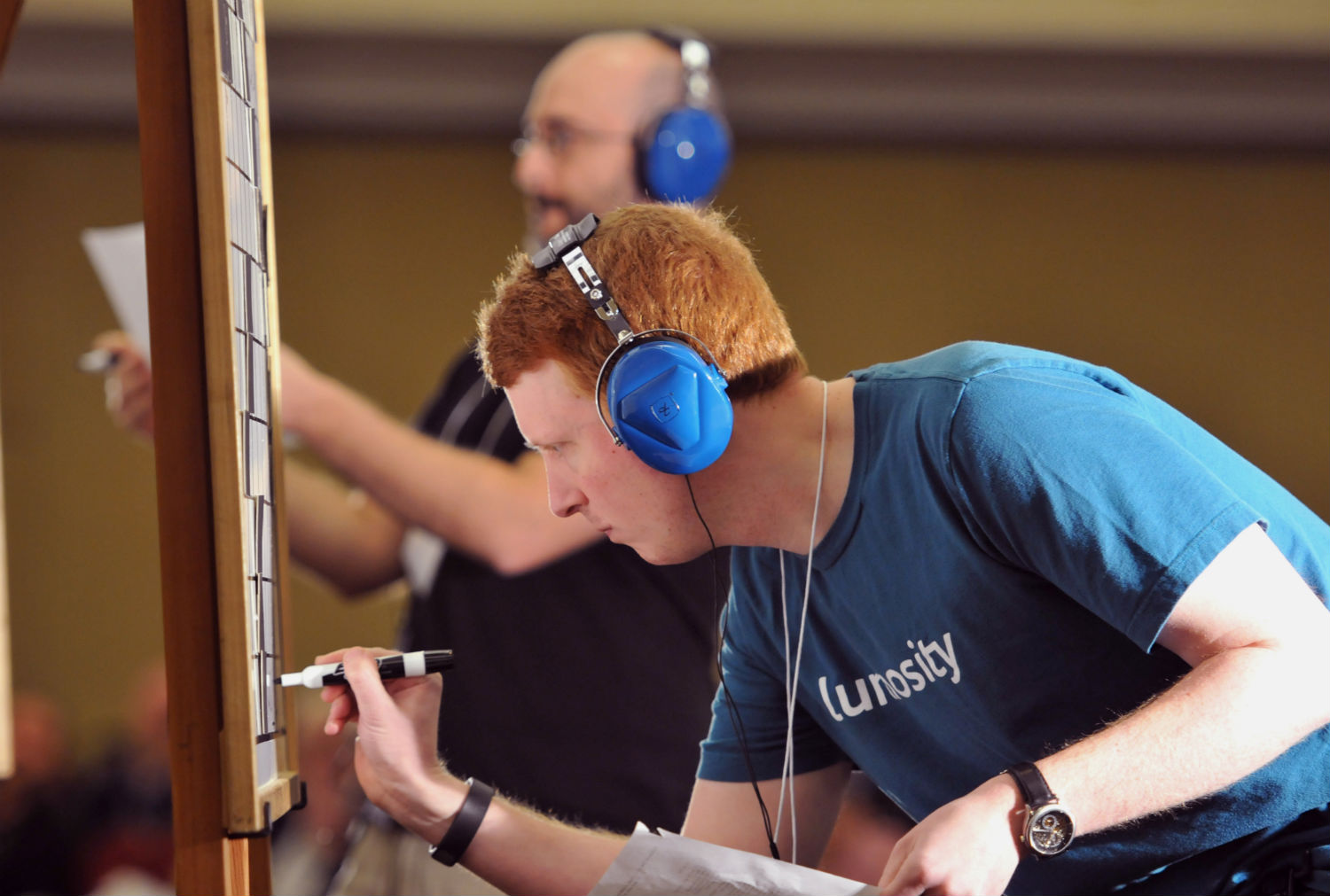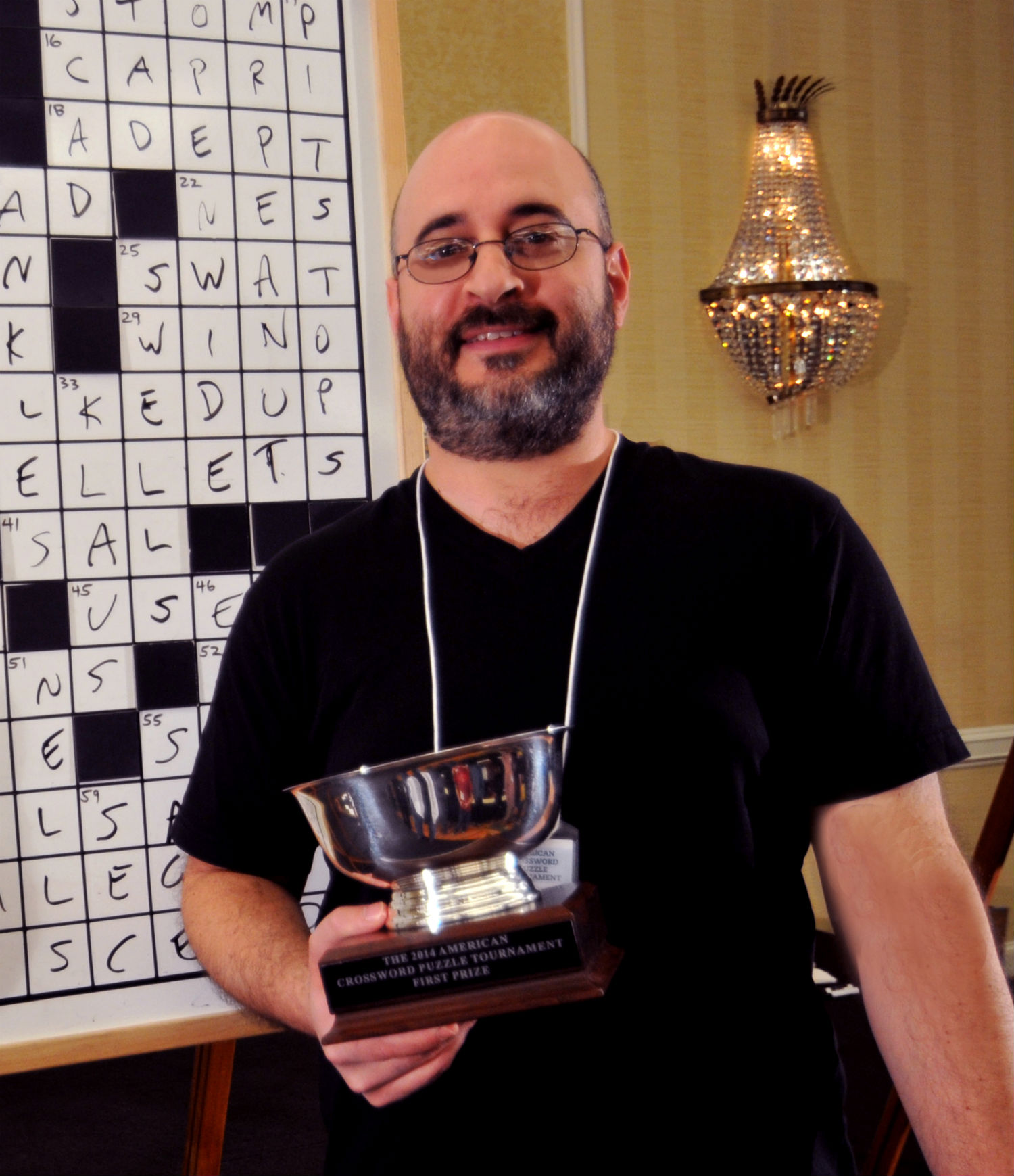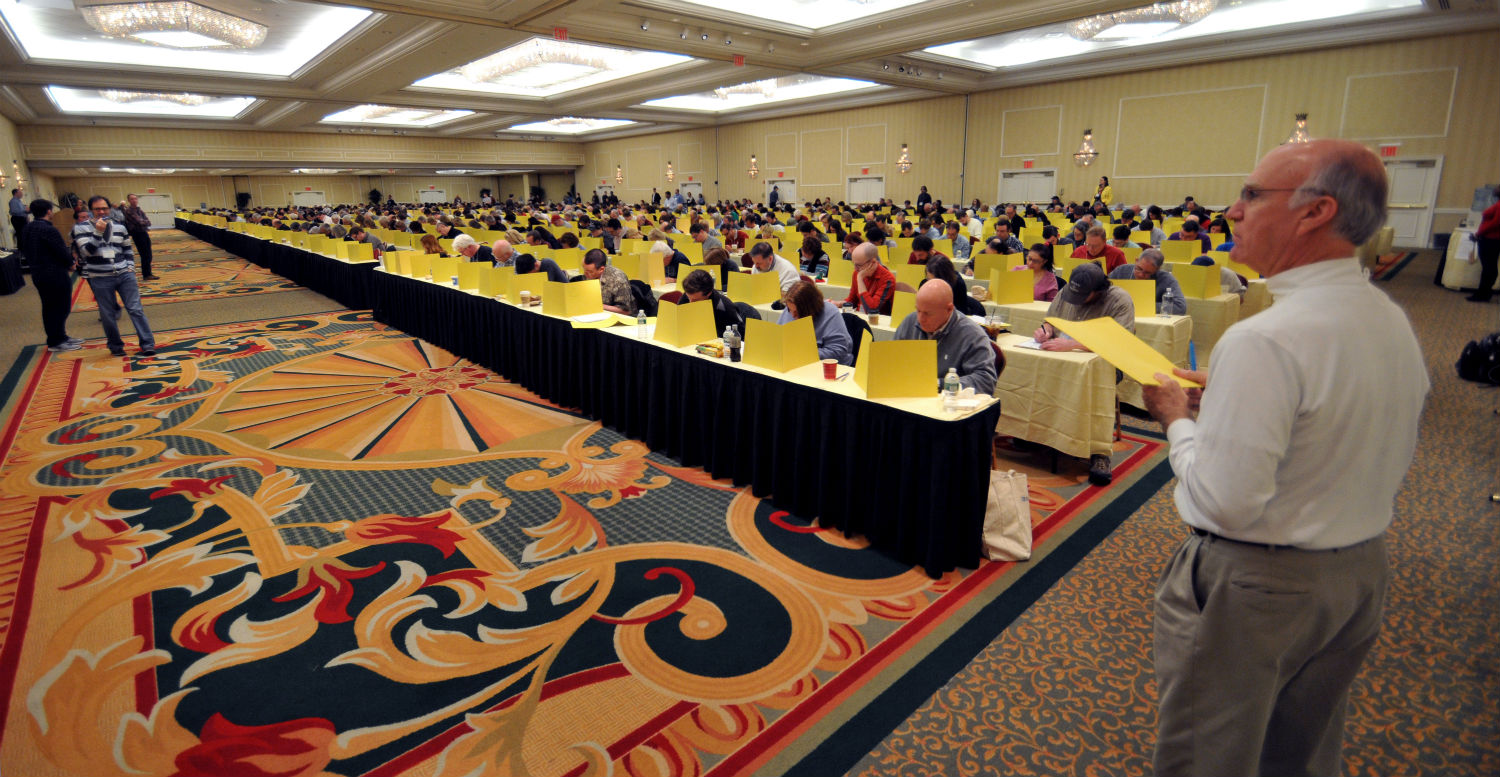
Never in the history of competitive crossword puzzle solving has there been a rivalry like the one between Tyler Hinman and Dan Feyer. So says Will Shortz, crossword editor for the New York Times and director of the annual American Crossword Puzzle Tournament, which concluded its 37th year on Sunday.
In the finals, the three top ranked solvers stood before giant white-board puzzles in front of a crowded room, wearing sound-muffling earphones. They raced to fill in the blanks as announcers made crowd-pleasing jibes about the clues and discussed the merits of beginning in the northeast corner. The competition ended when Feyer, a 36-year-old freelance pianist wearing a black T-shirt and salt-and-pepper beard, finished the final puzzle in 7 minutes and 18 seconds. It was a puzzle crafted for those fluent in crossword grammar and tricks, in which clues like “Salt shakers” (six letters) were meant to yield answers like swells—the shakers being waves on the sea and the salts being seasoned sailors.

The win was Feyer’s fifth in a row, which meant he was one step closer to becoming the colossus of clues, the sultan of solving! It meant that he had finally tied Hinman’s record for consecutive wins—one of a dwindling few feathers the 29-year-old game designer had left in his cap since Feyer began his dominating run. “If Dan weren’t around, everyone would be oohing and ahhing over Tyler,” Shortz says. And the two of them, he says, are in a class of their own, the type who can flawlessly tear through a New York Times Sunday crossword in under four minutes. Most people, Shortz notes, would be “over the moon” if they finished one at all.
Sitting on a bench in San Francisco in a grey hoodie on Tuesday, gym bag in his lap, Hinman calmly remembers how the mood of the tournament changed in 2010, the first year Feyer won. “It was probably the only time in history, in anything, in any competition, that the guy who’s the five-time defending national champion is not the favorite,” Hinman says. The irony is that Feyer had never really been into crosswords, much less aware of the tournament, until he saw the documentary Wordplay—which followed young Hinman as he won his first title in 2005, before he could legally order a beer to celebrate the victory.
Since dethroning Hinman, Feyer has been the safe bet to take home the winner’s $5,000 check and silver bowl. “I like Tyler a lot personally. He’s a great guy. I feel bad that I have usurped him,” Feyer says. After five wins in a tournament that attracts upwards of 500 people from most of the states in the U.S., is he confident that he’s the best? “Yeah, I would say so,” he says. “It’s not by a large enough margin that I’m untouchable or anything.”
Shortz doesn’t sound so sure. “It’s possible,” he says of Feyer losing the bowl back to Hinman, who finished two minutes after the champion this year.
The yearly championship is conducted over two days, with competitors completing six puzzles in quiet ballroom sessions on Saturday, earning points and quicker times for correct answers while losing points for every mis-lettered square. On Sunday, all the contestants complete a seventh puzzle before it winnows to three finalists, who compete the last round on stage. After making it to the finals and coming in second three of the last four years, Hinman doesn’t sound so optimistic about his future chances. “There is that air of invincibility after a while,” he says. Unlike Feyer, who has finished in the fastest time for each of his wins, some of Hinman’s wins have come when faster solvers made mistakes and he didn’t, which is a bit like getting the gold medal after the first person to cross the finish line gets disqualified.

Shortz calls the two “polite competitors” and emphasizes that the mood at the tournament, as well as among puzzlers in general, is congenial. Each year, crossword-lovers congregate and debate over whether it’s really better to be a “pen guy” rather than a “pencil guy.” They discuss the benefits of using mechanical pencils with .7 mm lead versus .9 mm lead (“Some people like .5, but I don’t care to engage those people,” Hinman jokes.) And they talk training regimens: Hinman has been doing a few puzzles a day. Feyer has been doing up to ten. Some regulars on the circuit have told Shortz they’re solving 50.
For puzzle newcomers, Shortz has suggestions: look for fill-in-the-blank clues, which are usually more straightforward; pursue consonants rather than vowels; and if you get stuck, put the puzzle down and come back later. (Those who want to try to puzzles from this year’s competition can purchase them here.) Good players, he says, are good spellers and fast reactors who know a little bit about everything. Shortz doesn’t have any advice for players like Hinman or Feyer though, who he says have surpassed his solving ability, who can summon esoteric trivia in a moment and shuffle through permutations of a phrase’s meaning like a Rolodex. “It’s just mind-boggling,” Shortz says.
Feyer has already announced that he will retire if he gets eight consecutive wins, which would make him the winningest champion ever. Hinman, meanwhile, will be summoning the courage to try to break that streak. “There was an air of ‘he’ll be back,’” Hinman says of his fourth-place finish in 2010. “And I sort of have been back. I just haven’t been winning. And that’s what I need to combat. I need to cultivate my ability on those hard puzzles, and my belief that I can win, because right now, honestly, I don’t have that.”
If Hinman doesn’t get it back, there is always the consolation prize. “I don’t think anyone,” he says, “has ever been able to lay a better claim to the title of America’s second-best crossword solver.”
This is an edition of Wednesday Words, a weekly feature on language. For the previous post, click here.
More Must-Reads From TIME
- The 100 Most Influential People of 2024
- The Revolution of Yulia Navalnaya
- 6 Compliments That Land Every Time
- What's the Deal With the Bitcoin Halving?
- If You're Dating Right Now , You're Brave: Column
- The AI That Could Heal a Divided Internet
- Fallout Is a Brilliant Model for the Future of Video Game Adaptations
- Want Weekly Recs on What to Watch, Read, and More? Sign Up for Worth Your Time
Contact us at letters@time.com